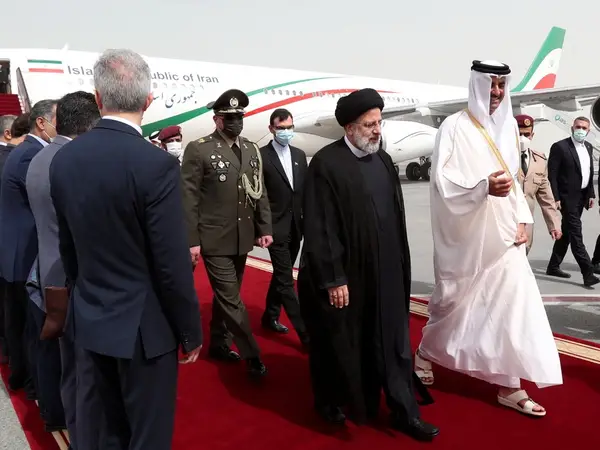Iran and Qatar signed several bilateral deals on Monday during a visit by Iranian President Ebrahim Raisi to Doha to attend the Gas Exporting Countries Forum.
Raisi said that he hoped the trip would help improve ties with other Persian Gulf Arab states.
Raisi's visit, the first to Qatar by an Iranian president in 11 years, comes as the United States and Iran hold indirect talks aimed at salvaging a 2015 nuclear deal. Some Persian Gulf states, such as Saudi Arabia and the United Arab Emirates deemed the agreement flawed for not addressing Iran's missile program and arming of regional proxies.
"We believe that the level of existing cooperation between the countries of the region is not commensurate with potential ties," Raisi said in joint remarks with Qatar Emir Sheikh Tamim bin Hamad al-Thani.
Raisi who assumed office last August has made improving ties with regional countries a declared cornerstone of his foreign policy, but during his first six months he did very little to remove irritants that hinder closer ties with many countries.
"Iran seeks to enhance these relations as our goal is regional convergence," said the Iranian president, who will attend a gas exporters' summit in Doha on Tuesday.
Iran-backed Houthi forces in Yemen who have been fighting a Saudi-backed coalition for seven years have continued missile and drone attacks against Saudi Arabia, and in January began targeting the UAE.
Earlier, Qatar and Iran signed 14 memoranda of understanding in the fields of aviation, trade, shipping, media, cancellation of visa requirements, electricity, standards, education and culture.
"We have today expanded our cooperation in the fields of the economy, energy, infrastructure, culture and food security," Raisi said.
Qatar has good ties with Iran, with which it shares a giant gas field. Tehran supported Doha after Saudi Arabia and its Arab allies imposed a boycott on Qatar in mid-2017 in a dispute over its ties with Islamist groups and with non-Arab Turkey and Iran.
Qatar's emir said in the joint remarks that his US-allied country was ready to do what it can to help bring an agreeable solution between Iran and the major parties at talks in Vienna to salvage the nuclear deal, which Washington pulled out of in 2018.
Reports in January spoke of Qatar acting as a mediator to arrange direct talks between Tehran and Washington. But so far Iran has rejected negotiating directly with the US.
Raisi on Monday reiterated earlier statements by Iranian officials that US pressures and sanction have been defeated. President Joe Biden decided early in his presidency to return to the 2015 nuclear deal and began indirect talks with Tehran.
Iran's oil minister said on Monday that unilateral sanctions against members of the gas forum threaten global energy security and that Iran provided the best option for gas exports to east and west, the semi-official Tasnim news agency reported.
Iran has faced gas shortages at home because of record high consumption, particularly for winter household heating, and has had to cut supplies to cement plants and other industries.
With reporting by Reuters
